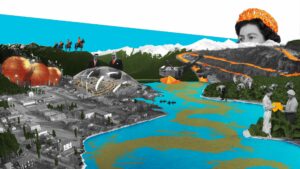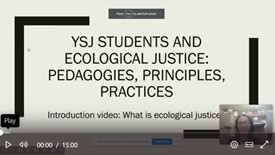Humans are, and will always be, entirely dependant on a healthy world and its functioning ecosystems. From needing the correct temperatures and nutrient-rich soil for food production, low-particulate and nitrate levels in the air to breath, or water sanitation to drink and avoid disease, we are deeply entangled into the ecological world. Our interconnection with the environment means that as habitats are lost, natural disasters occur, the land is exploited, or as we pollute (in various ways), people will be experiencing the same loss. Not only will the effects of environmental degradation have a profound and far-reaching impact on nonhuman lives, but will on ours too. These will have direct physical consequences and may also create devastating socioeconomic challenges.

Listen to the Ecopolitics podcast on environmental racism here.
This becomes a justice issue as the effects of environmental degradation are not evenly distributed, and certain communities feel its effects at radically different rates. There are many factors which contribute to this, such as geopolitical factors, wealth, and government policy. Those who are impacted most by ecological injustices are often also experiencing poverty, have a lack of social mobility and power, and do not have access to their own land or affordable and safe housing (JSS.org). It is the conjunction between ecological devastation and systemic disadvantage which creates the largest impact.

Watch Cath’s introduction to ecological justice here.
As Cath Heinemeyer, co-coordinator of the Living Lab, explains, ecological justice is ‘the recognition that environmental crises hit the most disadvantaged first and hardest.’ In using examples such as of rainforests in Argentina and safe drinking water in Flint, USA, Heinemeyer shows how this issue is a global one. Occurring in both poorer and richer countries, it is those on low incomes and people of colour who are being disproportionately impacted. She argues ‘that as environmental tipping points are being reached, there are no environmental crisis that does not also become a social crisis, and no social crisis that doesn’t also have environmental causes and effects.’ An example of this in England is the devastating story of Ella Adoo Kissi-Debrah, a nine-year-old girl whose death was caused by exposure to excessive air pollution. Living in Lewisham, where particulate levels had superseded the WHO guidelines, and being asthmatic, Ella’s death has raised concerns about pollution levels and the disproportionate impact throughout the city. Ella’s mother, Rosamund Adoo Kissi-Debrah, now campaigns for better air quality and justice for her daughter.
It is important to recognise that those most impacted are often not the most influential polluters. An example of this is the exportation of English landfill to countries in the Global South. The impacts of our actions in the North, and especially the wealthy’s actions, are distanced as a way of legitimising damaging practices. In having an awareness and a social consciousness of how different groups or communities are impacted, we challenge our practices and policies and can find better solutions. To tackle injustice, it is critical to use differing methods and viewpoints to question our current systems and ways of living. In breaking down ecological and social hierarchies, we can begin to reckon with what is truly sustainable for the human and nonhuman alike, and how can we revise our way of life to not endanger ourselves or others.
The Living Lab takes an interdisciplinary holistic approach as it works to uplift marginalised voices and encourage insightful perspectives into how we can change going forward. Ecological justice is a topic which is discussed at grassroots-level but is often under discussed when it comes to government decisions. Yet through our collaboration with the City of York Council, we hope to ensure that those impacted most will be fully considered in policy making and that sustainable and healthier environments are prioritised in York as well as and on campus.